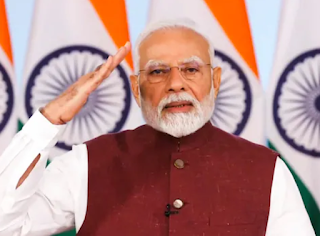Prime Minister Narendra Modi has issued a stern and strategic warning to Pakistan, making it unequivocally clear that 'Operation Sindoor'—India’s powerful military response to the Pahalgam terror attack—is not a one-time event, but the foundation of a new national counter-terrorism doctrine. This comes after India launched drone and missile strikes on 11 Pakistani military sites and airbases, and dismantled nine terror camps, reportedly killing over 100 terrorists.
In his first address to the nation since the operation, PM Modi outlined a new, assertive national security policy that puts military retaliation at the heart of India’s response to terrorism. Key takeaways from his 22-minute speech include:
1. New Counter-Terror Doctrine: ‘Operation Sindoor’
“Operation Sindoor is India’s new policy against terrorism, the new normal,” Modi said.India, he noted, has not called off operations completely—only paused them, keeping the option for further strikes open, depending on Pakistan’s conduct going forward.
2. No Space for Terror-Talk Paradox
Reiterating India's long-held position, the Prime Minister declared:
“Terror and talks cannot go together. Water and blood cannot flow together.”India has now formally linked the continuation of any bilateral dialogue to Pakistan’s complete dismantling of terrorist infrastructure. He stated that the Indus Waters Treaty (IWT), suspended after the Pahalgam attack, is under review.
3. Pakistan Warned Against Nuclear Blackmail
In a sharp rebuke to Islamabad’s nuclear posturing, PM Modi warned:
“We will not succumb to nuclear blackmail.”He framed Pakistan’s use of nuclear threats as a bluff and assured the Indian public that the country is prepared to counter any such coercion with confidence and strength.
4. Ceasefire Driven by Pakistan’s Plea
The ceasefire on May 10 came, the PM revealed, only after Pakistan urgently reached out to India:
“They were caught completely off guard. Our operations dismantled their terrorist infrastructure in a matter of days,” Modi said.Indian forces, he noted, inflicted such severe destruction in just three days that Pakistan's military sought contact with India’s DGMO, asking for a truce.
5. India’s Redefined Dialogue Agenda
Any future discussions with Pakistan, Modi stressed, would have a single agenda:
“If talks are held, they will be about Pakistan-Occupied Kashmir (PoK) and nothing else.”
This marks a decisive shift in India’s geopolitical posture. Rather than reacting defensively, the country is now setting the terms of engagement, both diplomatically and militarily. It also signals that future terror attacks will be treated as acts of war, drawing swift and targeted military retaliation.
India’s strategic doctrine is now clearly oriented around proactive deterrence, high response credibility, and a zero-tolerance approach toward cross-border terrorism. The message to Islamabad—and the international community—is that India will no longer absorb attacks without consequence.



